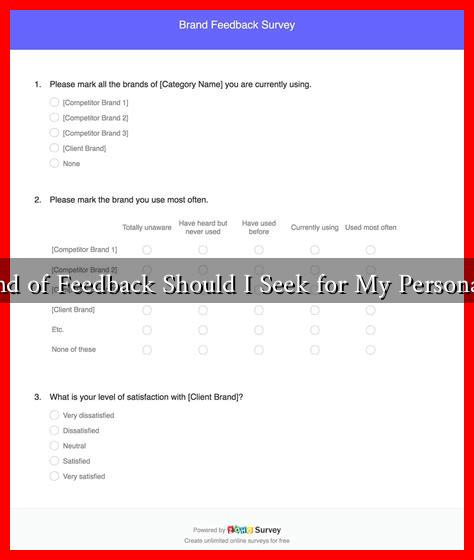-
Table of Contents
What Kind of Feedback Should I Seek for My Personal Brand?
In today’s digital age, personal branding has become a crucial aspect of professional success. Whether you are an entrepreneur, a freelancer, or a corporate employee, how you present yourself online and offline can significantly impact your career trajectory. One of the most effective ways to enhance your personal brand is by seeking feedback. However, not all feedback is created equal. Understanding what kind of feedback to seek can help you refine your brand and achieve your goals. This article explores the types of feedback you should consider and how to effectively gather it.
Understanding the Importance of Feedback
Feedback serves as a mirror, reflecting how others perceive your personal brand. It can provide insights into your strengths and weaknesses, helping you to make informed decisions about your branding strategy. According to a study by the Harvard Business Review, individuals who actively seek feedback are more likely to improve their performance and achieve their goals.
Types of Feedback to Seek
When it comes to personal branding, feedback can be categorized into several types. Here are the most valuable ones:
- Peer Feedback: Colleagues and peers can provide insights into how your brand is perceived within your industry. They can highlight your strengths and areas for improvement based on their experiences working with you.
- Mentor Feedback: A mentor can offer a broader perspective on your personal brand, drawing from their own experiences. They can help you identify opportunities for growth and provide guidance on how to navigate challenges.
- Client Feedback: If you are in a service-oriented profession, client feedback is invaluable. It can help you understand what clients appreciate about your brand and what aspects may need refinement.
- Online Feedback: Social media platforms and professional networks like LinkedIn can provide insights into how your brand is perceived online. Monitor comments, likes, and shares to gauge engagement.
- Self-Assessment: While not external feedback, self-assessment is crucial. Reflect on your branding efforts and identify what resonates with you and your audience.
How to Gather Feedback Effectively
Once you understand the types of feedback to seek, the next step is to gather it effectively. Here are some strategies:
- Surveys and Questionnaires: Create anonymous surveys to gather honest feedback from peers, clients, or mentors. Tools like Google Forms or SurveyMonkey can facilitate this process.
- One-on-One Meetings: Schedule meetings with trusted colleagues or mentors to discuss your personal brand. Prepare specific questions to guide the conversation.
- Social Media Polls: Utilize social media platforms to conduct polls or ask for feedback on specific aspects of your brand. This can be a quick way to gather insights from a broader audience.
- Networking Events: Attend industry events and engage in conversations about your brand. Use these opportunities to solicit feedback in a more informal setting.
Case Studies: Successful Personal Branding Through Feedback
Several successful individuals have leveraged feedback to enhance their personal brands:
- Elon Musk: The CEO of Tesla and SpaceX often engages with his followers on Twitter, using their feedback to shape his companies’ directions and public image.
- Marie Forleo: An entrepreneur and author, Forleo actively seeks feedback from her audience through surveys and social media, allowing her to tailor her content to meet their needs.
Conclusion: The Path to a Stronger Personal Brand
Seeking feedback is an essential step in building and refining your personal brand. By understanding the types of feedback to seek and employing effective strategies to gather it, you can gain valuable insights that will help you grow professionally. Remember, feedback is not just about criticism; it’s an opportunity for growth and improvement. Embrace it, and you will find yourself on a path to a stronger, more impactful personal brand.
For more insights on personal branding, consider exploring resources like Forbes.


